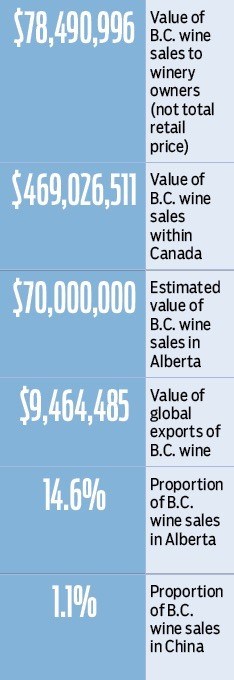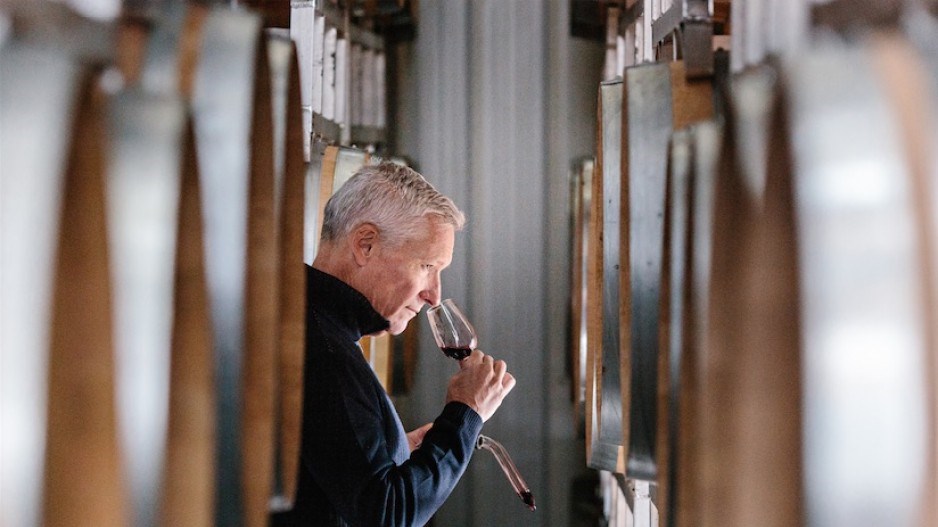Alberta Premier Rachel Notley’s decision to ban imports of British Columbia wine in her province is expected to cost B.C. winery owners about $70 million annually in sales unless they can find new buyers.
And while the B.C. government plans to challenge the boycott through the Canadian Free Trade Agreement, B.C. winery owners are devising strategies for launching or expanding international sales.
China has so far been the focus for many winery principals, with that country accounting for about 55% of the $9,464,485 worth of B.C. wine that winery principals sold to distributors, retailers or restaurants outside Canada in 2016, according to the British Columbia Wine Institute.

To find success in China, the key is to visit, said Painted Rock Estate Winery Ltd. principal John Skinner, who started selling wine in China seven years ago after visiting distributors in Shanghai and Chengdu.
His wine was so well received that sales ramped up to be about 40% of his production, or around 2,000 cases per year.
“What I’ve tried to do is grow our winery’s brand on the international stage, and that was just a business decision,” Skinner told Business in Vancouver. “I wanted to earn a price point in the international market.”
After a few years of rapidly growing exports to China, Skinner decided to scale back those sales because he thought that having one buyer be responsible for 40% of his sales made his winery vulnerable.
He now sells about 15% of his 7,000-case production to buyers in China, Japan and Europe and has a plan to expand European sales by visiting the world’s largest wine festival – Germany’s ProWein Trade Fair in Dusseldorf next month.
Like Liquidity Wines Ltd. principal Ian MacDonald, Skinner has a trip planned for London, England, where wine importer The Wine Treasury has become a customer.
“We did some work last year in London in May so we’re coming back this year in May to follow up,” MacDonald said.
Events lined up in the United Kingdom capital include one hosted by private members’ club 67 Pall Mall as well as one hosted by the High Commission of Canada in the United Kingdom at Canada House.
“With foreign markets, you really have to go and spend a bit of time,” MacDonald said.
“You have to build up relationships and have them taste your wine and get to know you and your winemaker. They’re very knowledgeable people over there and they’re not shopping for a pretty label. They’re shopping for the quality of the wine. So the fact that we’re going back this year and people want to see us again is a positive indication that we’re on the right track.”
For winery principals who want to network with wine buyers, sommeliers and international media but do not want to leave the province, MacDonald and Skinner say it would be worthwhile to attend the Vancouver International Wine Festival (VIWF), which runs February 24 through March 4.
Spain and Portugal are the theme countries this year although 173 wineries from 16 countries will take part, festival director Harry Hertscheg told BIV.
His festival has sold 68 trade passes, mostly to wine buyers, sommeliers or other industry insiders from outside Metro Vancouver, he said.
Representatives of the Liquor Control Board of Ontario, Manitoba Liquor & Lotteries and the Yukon Liquor Board attend the festival regularly, and a partnership between the VIWF and Tourism Vancouver is bringing media and social influencers from across Canada and the U.S. as well as some from India, he added.
“We also have a sommelier who is coming from a wine bar in Frisco, Texas,” said Hertscheg while scanning a list of people who have bought passes to the festival. “The wine world will be here.”
Milestones for the Vancouver International Wine Festival
1979:
Vancouver Playhouse International Wine Festival launches with one winery: Robert Mondavi Winery
1986:
The number of wineries involved significantly increases, with most being from California, Oregon and Washington
1987:
First year that the festival welcomes wineries from a wide range of countries, such as Lebanon
1988:
Festival moves to the Vancouver Convention Centre after years of being held at the Hyatt Regency
1996:
Festival has a theme region for the first time as Bordeaux wines are featured
2009:
Festival starts grouping wineries by country instead of alphabetically
2010:
Festival moves to the new Vancouver Convention Centre West
2012:
Festival peaks in size with more than 60 events, and feedback from the industry is that it was getting too big for winery principals to handle so many suppliers and different events
2013:
Festival changes its name to the Vancouver International Wine Festival and starts donating proceeds to Bard on the Beach
2014:
Festival adds a Saturday afternoon tasting
2017:
Festival hosts the largest-ever gathering of Canadian wineries under one roof •



